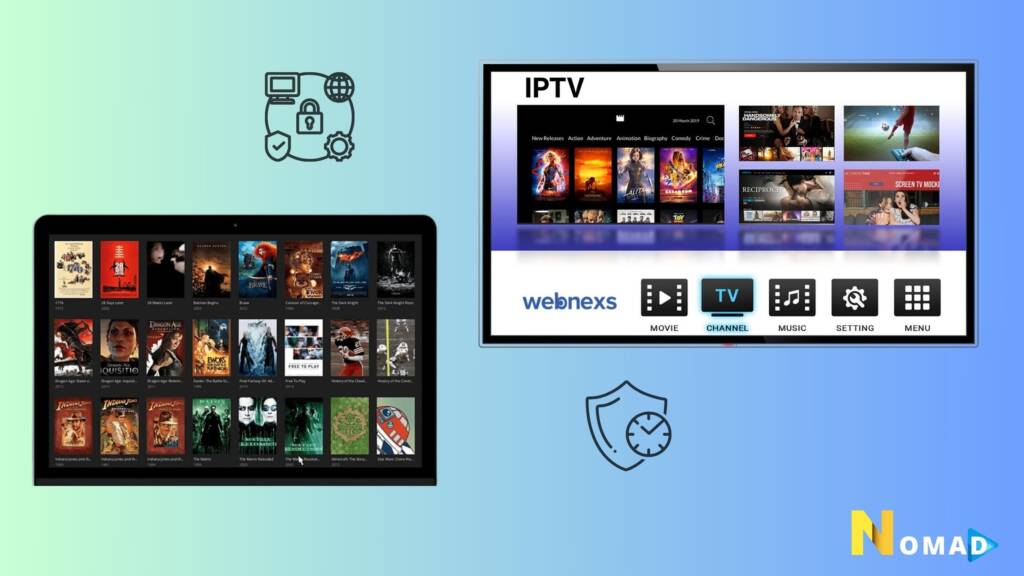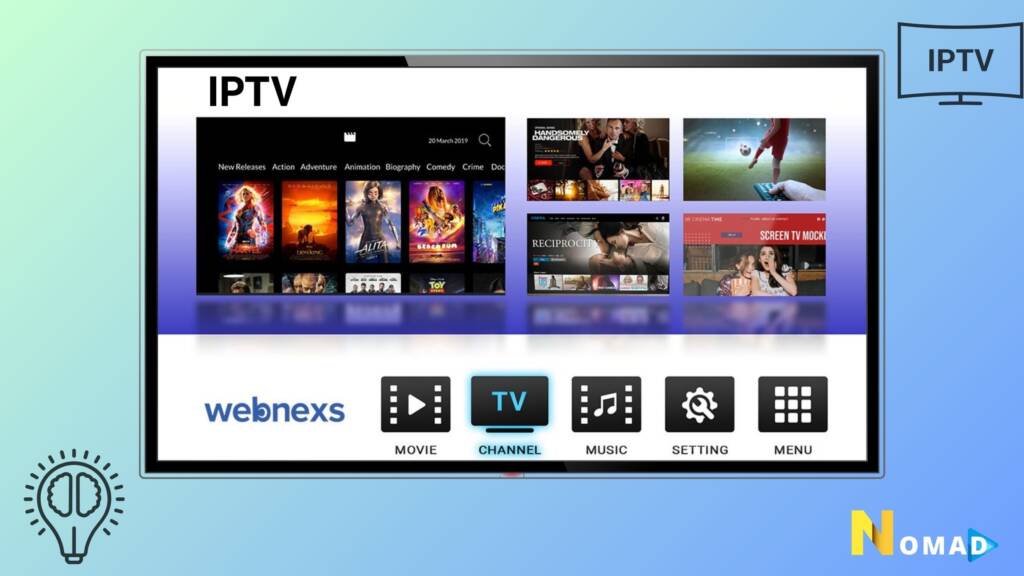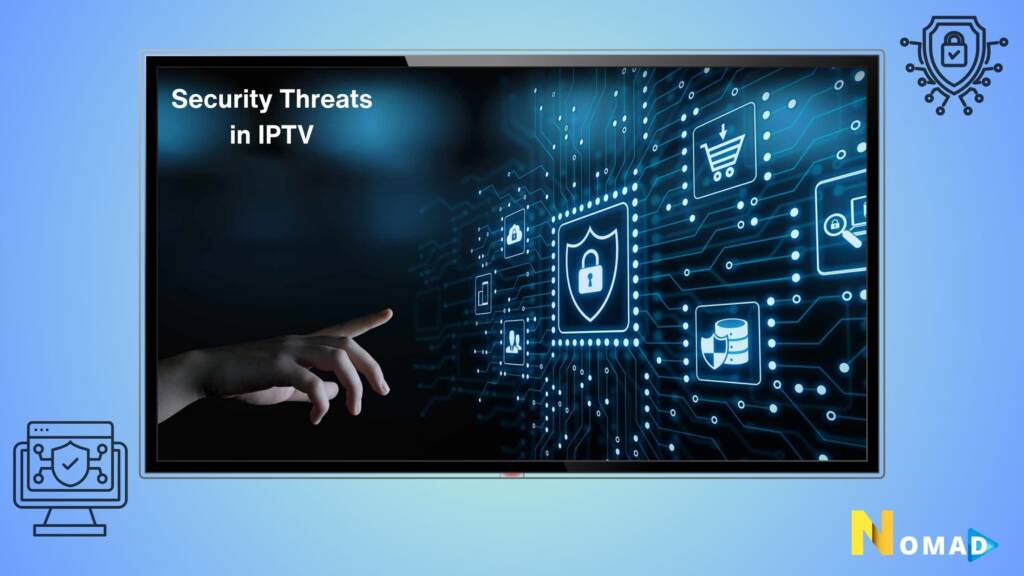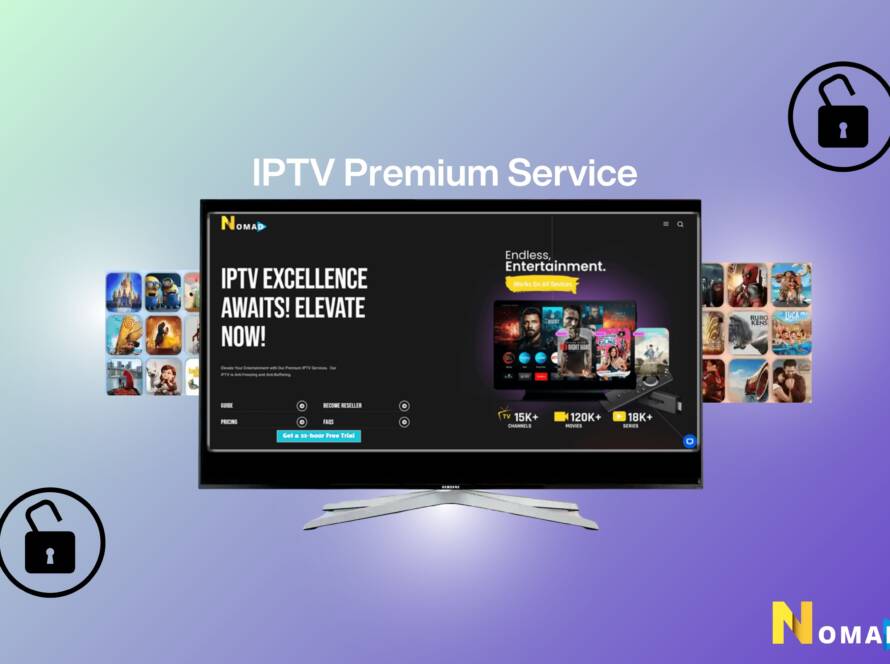As technology changes all the time, IPTV (Internet Protocol Television) has become an important part of modern entertainment, providing unmatched ease of use and access to a huge library of material. But as we move into the new age of streaming, it’s important to put security first in IPTV to keep our personal information safe and make sure we can watch without any problems. Making sure Security in IPTV is secure means keeping your information safe from threats like data breaches, unauthorized access, and piracy. We don’t have to worry about our privacy when we watch our favorite shows and movies. Let’s look at the most important parts of IPTV security and learn how to keep our digital leisure safe.
Table of Contents
Security in IPTV: Ensuring Safe and Reliable Streaming

Making sure IPTV is safe is more important than ever as it continues to change how we watch media. Security in IPTV is convenient and flexible, but it also comes with a big duty to protect content and user data from a wide range of online threats. Security in IPTV includes a lot of different methods and tools that are meant to keep the streaming process safe from threats like hackers, piracy, and data breaches.
For content companies, strong Security in IPTV means encrypting data streams to stop people from accessing and sharing them without permission. This is very important for keeping the service honest and making sure that people who make material get paid fairly. For users, Security in IPTV includes things like secure authentication and encrypted communication to keep their personal information safe and make sure that bad things don’t get in the way of their watching experience.
In addition, a safe network system is needed to stop attacks that could stop services from working or damage data. As digital viewing changes, so does the focus on Security in IPTV. This means that Security in IPTV needs to be constantly updated and on the lookout for new threats. Setting security as a top priority in Security in IPTV lets us stream in a safer, more reliable way that protects both content providers’ rights and users’ privacy.
Understanding IPTV Technology

Before you can fully understand why security is important in Security in IPTV , you need to know what IPTV technology is. IPTV, or Internet Protocol Television, is a big change from the old ways of programming because it uses the internet to send TV shows to people. Security in IPTV streams media directly to each device over IP networks, giving you a personalized and on-demand watching experience.
This is different from traditional cable or satellite services, which send signals in a one-to-many format. With this cutting-edge tech, people can watch live TV, get to video-on-demand (VOD) libraries, and even enjoy time-shifted media, which lets them stop, rewind, or watch shows whenever they want. But this ease of use comes with its security problems. IPTV material can be attacked by many types of hackers because it goes over the internet. This is why security is so important for IPTV.
IPTV security is based on keeping these streams safe from people who shouldn’t be able to see them and making sure that user info stays private and safe. A very important part of this is encryption, which keeps the data safe as it moves from the service provider to the user’s device. Strong authentication and authorization systems are also needed to keep IPTV safe, making sure that only authorized users can view the content they are allowed to see.
As IPTV technology changes, so should the tactics and technologies we use to keep Security in IPTV safe. These should not only deal with current threats but also look ahead to see where they might be weak in the future. Understanding the ins and outs of IPTV technology and the security needs it has helps people come up with better ways to protect both content providers and users in the rapidly expanding world of digital entertainment.
Common Security Threats in IPTV

More and more people are choosing IPTV as a way to watch TV and videos. This means that it is also becoming a target for security threats that threaten the service’s stability and users’ privacy. Both providers and users need to know about these common security risks to take effective steps to protect themselves and make sure that streaming is safe and enjoyable. Piracy is one of the biggest security risks in Security in IPTV.
This is when people who aren’t supposed to can access and share copyrighted material without permission, violating the rights of content creators and hurting the businesses that make money from legal providers. This widespread piracy not only causes problems with the law but also puts users at risk of security problems when they watch streams that have been hacked. Aside from that, malware and ransomware attacks are very dangerous to Security in IPTV.
Bad people use holes in the system to stop services, steal private data, or demand cash payments. Another common worry is data breaches, which happen when someone gets into user data without permission and does something bad with it, like stealing someone’s name or money. Also, people who haven’t paid for a contract or are using illegal methods to get to premium content using Security in IPTV services without permission are against the rules and hurt the businesses that offer these services.
These security risks show how important it is to have strong security measures in place to keep out people who aren’t supposed to be there, encrypt private data, and keep IPTV services running smoothly. Providers and users can both lower risks and make streaming safer and more reliable for everyone by tackling these common security threats head-on and putting in place full security procedures.
Key Components of IPTV Security
A few key parts are very important for keeping IPTV safe and protecting both the service and its users from viruses and other harmful things. For IPTV security, encryption is one of the most important parts because it protects against unauthorized entry and data interception. IPTV providers can make sure that material stays private and safe from prying eyes while it’s being sent over the internet by encrypting data streams.
Additionally, user authentication and permission systems are an important part of IPTV security because they let providers check users’ identities and only let authorized people in. This helps keep material from being viewed without permission and keeps user accounts from being hacked. Along with encryption and identification, the network infrastructure is a very important part of making IPTV safe.
Secure network protocols, firewalls, and attack detection systems help protect the infrastructure from cyber threats. This keeps Security in IPTV services safe and available. IPTV security is also greatly improved by strong digital rights management (DRM) technologies that manage how material is accessed, shared, and watched.
DRM solutions help content owners protect their intellectual property rights, make sure that licensing deals are followed, and stop people from copying or redistributing their content without their permission. Overall, these important parts work together to create a full security system that protects the Security in IPTV environment. This way, both content providers and users can be sure that their data and content are safe.
Encryption in IPTV
One of the most important things that encryption does to improve IPTV security is to keep data sent over the internet safe and private. When it comes to IPTV, where digital material is sent to users’ devices through IP networks, encryption is a very important way to keep sensitive data safe from people who shouldn’t have access to it.
Encrypting data streams is one way for IPTV companies to keep content safe from bad people who might try to listen in on transmissions or change the content that is being sent. This helps keep the service’s trustworthiness and privacy, as well as the privacy of its users. Also, encryption discourages piracy by making it harder for people who aren’t supposed to be there to access and share copyrighted material without permission.
Strong encryption standards, like Advanced Encryption Standard (AES) or Rivest-Shamir-Adleman (RSA), make sure that data stays safe as it travels from the provider’s computers to the user’s device. In addition, end-to-end encryption makes Security in IPTV even safer by encrypting data at both ends of the transfer.
This keeps it safe from possible threats at all times during the delivery process. Overall, encryption is a key part of Security in IPTV. It gives both users and providers peace of mind that their data and material can’t be accessed or changed by people who aren’t supposed to.
Securing the Network Infrastructure
Protecting the network infrastructure is the most important thing that can be done to keep IPTV services safe. Cyberattacks are always a possibility, so Security in IPTV companies need to take strong steps to keep their networks safe from holes that could let hackers in and compromise their users’ privacy and the quality of their services.
For example, firewalls are the first line of defense because they watch and manage all incoming and outgoing network traffic. This stops people who aren’t supposed to be there from getting in and keeps possible threats out. Virtual private networks (VPNs) are also very important for improving security in Security in IPTV because they encrypt data sent between the provider’s servers and the user’s device.
This keeps personal data safe from people who want to steal it. Also, intrusion detection systems (IDS) are very helpful for finding and reacting to strange activities or possible security holes in the network.
This lets service providers protect their infrastructure and lower risks before they happen. Security in IPTV providers can greatly improve the security of their services by using these network security measures and following best practices. This will make streaming safer and more effective for users.
Preventing Piracy in IPTV
Stopping piracy in Security in IPTV is a key part of keeping the business honest and thriving while also making sure that Security in IPTV services are safe. Piracy is bad for everyone: it hurts businesses that make and sell material, it violates people’s intellectual property rights, and it could put users at risk of security problems. Because of this, IPTV companies must take strong steps to stop piracy and protect everyone’s interests.
The use of digital rights management (DRM) technologies is an effective way to stop people from stealing content. These technologies let content owners control who can access their content, make sure that licensing deals are followed, and stop content from being shared without permission.
Putting DRM tools on their platforms helps IPTV providers stop people from pirating and keep the material safe from people who aren’t supposed to see or share it. Legal and technical steps like watermarking, content fingerprinting, and geo-blocking can also make Security in IPTV more secure by stopping illegal streaming and identifying illegal streams so that law enforcement can take action. It is also important for industry players, law enforcement, and regulatory bodies to work together to successfully fight piracy.
The Security in IPTV business can make the ecosystem for distributing content safer and more stable by working together to spread knowledge, enforce rules, and bring offenders to justice. Ultimately, stopping Security in IPTV piracy needs a multifaceted approach that addresses both the legal and technical aspects of the problem. Everyone must work together to maintain Security in IPTV and protect the rights of content creators and users.
Data Privacy in IPTV
Data privacy in IPTV is very important for keeping people’s trust and making sure the site stays successful. This shows how important security is in IPTV. IPTV services collect a lot of information about their users, from personal details to make accounts to viewing habits to suggest material.
Users trust IPTV companies with private data and expect them to handle it responsibly and safely. So, Security in IPTV providers need to put in place strong data privacy measures to keep this information safe from people who shouldn’t have access to it or who might misuse or abuse it. It is important to follow strict data protection rules like the General Data Protection Regulation (GDPR) to keep IPTV safe and make sure that legal requirements are met when collecting, handling, and storing user data.
To protect user privacy and keep IPTV services open, it is also important to remove personal information from user data and get clear permission before collecting and using that data. IPTV providers can build trust among users, make IPTV safer, and make sure the platform stays a reliable source of entertainment for a long time by putting data protection first and taking strict steps to protect user data.
Challenges in Implementing IPTV Security
Putting IPTV security in place comes with several problems that need careful thought and strategic planning to solve. This shows how important it is to put security first in IPTV. Getting around the complicated technical and operational world of IPTV services is a big task. To securely send content to users, these services often need to combine a lot of different systems, protocols, and technologies.
Making sure that these parts work well together and don’t interfere with each other while still having strong security measures in place can be hard and take a lot of time and money. Also, it’s hard for companies to find a good balance between security and user experience in IPTV. Tough security measures are needed to keep user data safe and defend against cyber threats, but security rules that are too strict can make things less usable and take away from the viewing experience as a whole.
Finding the best mix between safety and ease of use is important to make sure that IPTV users can enjoy the services without giving up safety or ease of use. IPTV providers also have to deal with the constant task of keeping up with new security threats. Cyber dangers are getting smarter and happening more often, so service providers need to keep an eye out for them and take steps to protect themselves by putting in place strong security measures.
To keep security in IPTV working well and relevant, it’s important to keep up with new technologies, best practices in the business, and government rules. Even with these problems, IPTV providers must keep security as a top concern because it is so important for keeping users’ trust, keeping content safe, and making sure that IPTV services will be around for a long time in a world that is becoming more digital and connected.
Future Trends in IPTV Security
Looking ahead, the next few years will bring many exciting changes and improvements to IPTV security that will make it even safer and help deal with new threats in the digital world. Adding artificial intelligence (AI) and machine learning (ML) to IPTV security systems is a popular trend. This lets companies look at huge amounts of data in real-time, find oddities, and find possible security holes more accurately and quickly.
By using AI and ML algorithms, IPTV providers can improve their ability to find threats, spot trends of suspicious behavior, and take steps to reduce risks before they happen. This makes IPTV safer and helps them stay ahead of cyber threats. Using blockchain technology could also help make IPTV safer by creating a decentralized, unchangeable system for handling and verifying transactions, protecting the distribution of material, and making sure that user data is correct.
Blockchain-based solutions make things more clear, easier to track, and harder to change or get into without permission. This makes people believe in IPTV services more. There are also improvements in encryption technologies, like quantum-resistant cryptography, that could help protect IPTV in the future against the growing threat of quantum computing, which could make standard encryption methods useless.
IPTV providers can continue to improve security in IPTV, protect user privacy, and give users around the world a safe and reliable streaming experience by adopting these future trends and adding new technologies to their security plans.
Conclusion
To sum up, IPTV needs strong security to protect user privacy, information, and the platform’s integrity. By using encryption, authentication, and other network security measures, IPTV companies can lower risks and make streaming safer for their customers. Even though there are problems and new risks, the future of IPTV security looks bright thanks to progress in AI, blockchain, and encryption. IPTV companies can keep improving security, build trust among users, and ensure the long-term success of the platform by staying alert, taking action, and being open to new ideas.
FAQs
1. What should I do if I suspect my IPTV service has been compromised?
If you suspect that your IPTV service has been compromised, it’s essential to take immediate action. Contact your service provider to report the issue and inquire about steps you can take to secure your account and protect your personal information.
2. How can I tell if my IPTV provider is secure?
To determine if your IPTV provider is secure, look for indicators such as encryption protocols, secure authentication methods, and adherence to data privacy regulations. Additionally, research the provider’s reputation, reviews, and security practices to assess their commitment to protecting user data.
3. What are the signs of an IPTV security threat?
Signs of an IPTV security threat may include unusual account activity, unauthorized access to content, unexpected changes to service settings, and suspicious communication from the provider. If you notice any of these signs, it’s crucial to investigate further and take appropriate action.
4. Is it safe to use free IPTV services?
Free IPTV services may pose security risks, as they may lack robust security measures and could be sources of pirated content. Users should exercise caution when using free IPTV services and consider the potential risks before accessing content through these platforms.
5. How can I enhance my security when using IPTV?
To enhance personal security when using IPTV, consider using strong, unique passwords for your accounts, enabling two-factor authentication where available, keeping software and devices updated, and being cautious of suspicious links or emails. Additionally, only use reputable IPTV services from trusted providers to minimize security risks.


